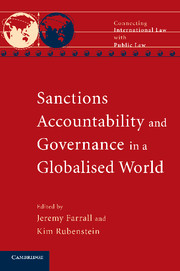Book contents
- Frontmatter
- Contents
- Contributors
- Series editors' preface
- Editors' preface
- Introduction: Filling or falling between the cracks? Law's potential
- PART I Setting down the foundations
- PART II Internationalising public law
- PART III Implementing Security Council sanctions
- 7 ‘A delicate business’: Did AWB's kickbacks to Iraq under the United Nations Oil-For-Food Programme constitute a violation of Australia's international obligations?
- 8 Should the United Nations Security Council leave it to the experts? The governance and accountability of UN sanctions monitoring
- PART IV The place of corporations
- PART V The role of lawyers
- PART VI Public law and public policy
- PART VII Parallel case studies
- Concluding remarks
- Bibliography
- Index
8 - Should the United Nations Security Council leave it to the experts? The governance and accountability of UN sanctions monitoring
Published online by Cambridge University Press: 05 October 2010
- Frontmatter
- Contents
- Contributors
- Series editors' preface
- Editors' preface
- Introduction: Filling or falling between the cracks? Law's potential
- PART I Setting down the foundations
- PART II Internationalising public law
- PART III Implementing Security Council sanctions
- 7 ‘A delicate business’: Did AWB's kickbacks to Iraq under the United Nations Oil-For-Food Programme constitute a violation of Australia's international obligations?
- 8 Should the United Nations Security Council leave it to the experts? The governance and accountability of UN sanctions monitoring
- PART IV The place of corporations
- PART V The role of lawyers
- PART VI Public law and public policy
- PART VII Parallel case studies
- Concluding remarks
- Bibliography
- Index
Summary
Introduction
The chapters in this collection use the example of United Nations sanctions as a means to explore the questions of accountability and governance that arise when legal norms are applied with cross-boundary effect. The boundaries in question are both physical, in the sense of clearly delineated national borders, as well as conceptual, as with the traditional distinctions that are drawn between the domains of public and private law, and between international and domestic law. Some contributors explore the broad theoretical questions that arise when seeking to enforce global norms across diverse jurisdictions (Danchin, Sampford). Some discuss accountability and governance at the international level, where the decision to apply cross-border norms is made (Chesterman, Hovell, Nasu). Some concentrate on the domestic interpretation, application and regulation of globally articulated norms (Botterill and McNaughton, Fraser, Nolan, Rice, Stewart, Tully). Others examine the way that actors at the domestic or regional level might influence the accountability and governance of actors at the international level, or vice versa (Boreham, Holmes, Mulgan, de Wet).
This chapter focuses on accountability and governance within the UN sanctions system for sanctions monitoring. The task of sanctions monitoring, which was traditionally undertaken by the Security Council's sanctions committees, is increasingly being delegated to independent bodies of experts. Over the past decade the Council has created a range of sanctions monitoring expert bodies. These bodies provide independent analysis of particular sanctions regimes and make recommendations to strengthen sanctions implementation.
- Type
- Chapter
- Information
- Sanctions, Accountability and Governance in a Globalised World , pp. 191 - 214Publisher: Cambridge University PressPrint publication year: 2009



